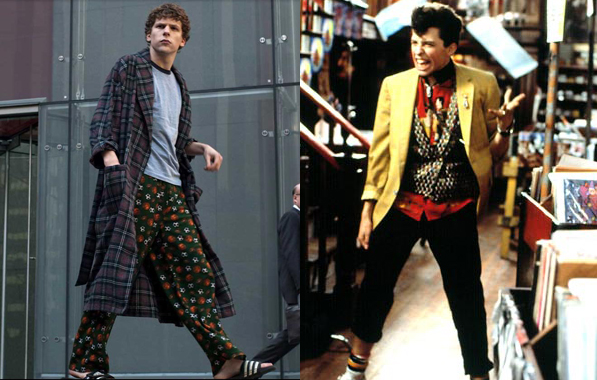Brat Pack 2.0?

EISENBERG IN THE SOCIAL NETWORK; CRYER IN PRETTY IN PINK
Predicted to “define a generation,” and spurred by a mania of cover stories, profiles, and speculation, the film dubbed “the Facebook movie,” is only partially about Facebook. Instead, The Social Network‘s themes—misunderstood ideals, of loneliness turned to anger and invention, of class and retribution—are the stuff of vintage anti-hero cinema. As director David Fincher remarked, “Creative change happens on the fringe of everything. It’s always on the edge, it’s in the margins, and then it’s adopted by the herd.”
Drawing from, among other influences, the canon of ’80s teenage angst, Fincher envisioned “the Citizen Kane of John Hughes movies.” While his admission is lighthearted–a friendly film quip, the available pop culture banter–Brat Pack parallels and the pursuit of oneness surface throughout the movie. Prom dates, varsity jackets, and virginity myths are not what’s at stake here, but allusions to Duckie, Bender, and “The Geek” resonate in Jesse Eisenberg‘s portrayal of Mark Zuckerberg: an outsider equal parts disgusted and intrigued with social status, access, and power.
Having recently celebrated its 25th anniversary, The Breakfast Club, once billed as the movie about “a brain, a beauty, a jock, a rebel, and a recluse” remains a cult favorite among old and new audiences. Far more upbeat with waggish teenage jokes and “eat my shorts” vernacular, its original treatise matches The Social Network‘s early reception. Janet Maslin’s 1985 New York Times review reads, “…John Hughes lets the kids challenge, taunt, and confront each other as if this were Twelve Angry Men. Personalities are dissected; tears are shed.” The same has already been expressed about Aaron Sorkin’s cutting swordplay, a script he himself likens to Sydney Lumet’s 1957 classic. Having recently re-watched it, he said “…I thought, this is the movie we just made. Five Angry Men.” A quarter century later, and Saturday detention at Shermer High School is as telling as the ugly allegations and deep insecurity on display in those stuffy Facebook deposition rooms.
Spotting stylistic likeness between Hughes’s more musical, pastel-hued high school comedies and Sorkin and Fincher’s effusive and crepuscular portrayal of a “punk, genius, prophet” can be a stretch. Yet, Judd Nelson’s sullen rants about “the richies” and “their fucking clubs” is heard in Eisenberg’s Mark, and his vexing hang-ups with Harvard exclusivity. Or take, for instance, Pretty In Pink‘s Duckie (Jon Cryer), and his jabs at Andie’s new, more popular, friends (“His name is Blane? Oh! That’s a major appliance, that’s not a name!”). That same mix of addled hurt and high-strung jealousy is exposed when Mark’s one true friend and Facebook co-founder, Eduardo, starts “punching” for one of Harvard’s most exclusive Finals Club, The Phoenix.
Hacking becomes Mark’s way of overcoming and beating the system. But unlike so many brat pack stories, his is far more ironic. As Fincher said, “…[the] guy who seems to have issues being able to communicate with other people has invented one of the greatest tools for communicating with people.”






